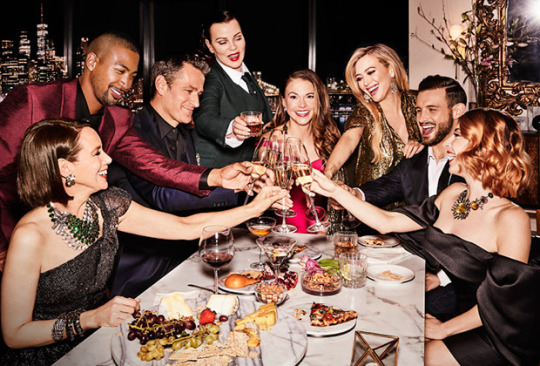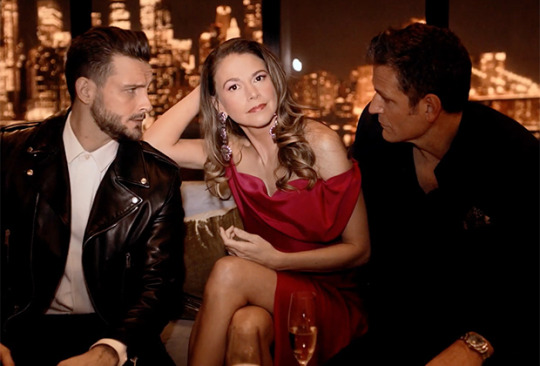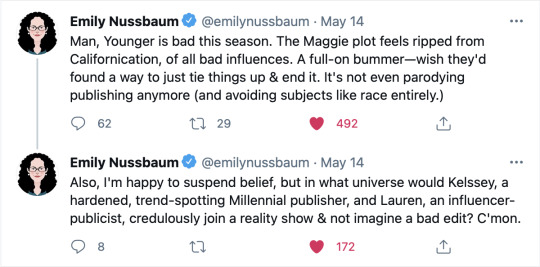#also since i was talking about why i'm a fan of the avs earlier. the ads are my ahl team cause used to live in milwaukee
Explore tagged Tumblr posts
Text
Luke Prokop scores his first AHL goal with the Milwaukee Admirals (making him the first openly gay AHL goal scorer, for those keeping track)
#an arbitrary metric obviously but another patch in the quilt of gay acceptance and inclusion in hockey!#one day i'm gonna compile all the social media videos about kopper i find interesting. his teammates acknowledging his relative#celebrity status etc.#luke prokop#milwaukee admirals#ahl#also since i was talking about why i'm a fan of the avs earlier. the ads are my ahl team cause used to live in milwaukee#way more normal reason lol. the ads aren't enough to turn me into a preds fan tho#videos#mine#went on a situationship date to an ads game once. lol
292 notes
·
View notes
Text
Goodbye to Younger
Unfortunate to say, I don’t think I have ever seen Sutton Foster on Broadway. I watched her previous show, the one season wonder, Bunheads, and felt obliged to follow her to Younger. I don’t have particularly strong feelings about Sex and the City, show runner Darren Star’s previous hit. There are huge gaps in the episodes I’ve seen, and I haven’t seen any since the first movie came out. I enjoyed watching it with friends, but never tried it alone. I bring this up, because I have mostly watched Younger all alone. The series about a recently divorced forty year old woman named Liza who lies about her age to get a job in publishing after years of being a stay at home mom. She lives with an artist friend her real age (Maggie), befriends a colleague her fake age (Kelsey) and quickly get in a love triangle with men from each age group (Charles and Josh, respectively). The first season wasn’t that well received. There were times while watching it that if felt cringeworthy. Criticism of being out of touch with the publishing industry was definitely warranted. I remember reading a review that called out an early plot involving Joyce Carol Oates not having a Twitter account when she really does have one and frequently trends for not great reasons. I cringed while watching that episode. (The reviewer, Miriam Krule was wrong about the long term treatment of the character of Diana. Younger would have been unwatchable if she were right long term.) After the first season Breanne L Heldman published an interesting interview on Yahoo! News with Darren Star and Marti Noxon about having buzzy shows on unexpected networks. But also Kate Dries at Jezebel also wrote an item about Hilary Duff, who plays Kelsey, covering Fleetwood Mac’s “Little Lies” that doubles as a “who’s actually watching Duff’s new show?” bit.

With the second season the press got immediately better. New Yorker critic (and long time SATC fan) Emily Nussbaum wrote a positive review about how the show mixes froth with more serious subjects like agism and difficult divorces. And from then on the critical response was generally good-but inclined to dismiss as fluff.
(I have to interject, the episodes that Liza’s ex-husband showed up seem to dampen the real reasons for their divorce and I am torn between seeing this as a sign of him actually being charming, and the show needing to move on quickly from exploring too dark topics.)
The ensemble gelled and I wanted to highlight this charming interview Molly Bernard, who played Lauren, did an
interview with Maria Elena Fernandez back in 2016. I liked this interview. She talks a lot about what her grandfather meant to her, as a person and acting coach. It covers too many of her gigs to be really insightful for Younger, but that is part of the charm. It’s interesting to focus on Lauren as a character representing the spirit of the series. My first impression was an impersonal, crass caricature of a millennial, what Liza had to work against to convince people that she is a millennial. At the end of the first season she threw herself a “Hot-Mitzvah”, like a Bat Mitzvah for when the awkward years the celebration normally occurs during are over a. The first episode of the final season includes a party for her thirtieth birthday, making something of a full circle moment. The first party definitely worked more for the show’s dramatic purposes, which is related to a theme in this good bye.
During the penultimate season, while the show was was at its peak of being loved by the people, Alissa Wilkinson dedicated one of Vox’s (now defunct) Episode of the Week columns to her changing thoughts on the series’s central love triangle. wrote about. I chose to include this article while I started drafting this, before the season actually aired, in the hopes that I would finish writing by the end of the season. (Obviously, it really didn’t work out.) The article covers Wilkinson’s impression of the show from the beginning. She was Team Charles in the love triangle, but plot points within the first four episodes of the sixth season made her rethink that. As the final season disappointed some of the show’s biggest supporters were disappointed, I thought of it as insightful on how the show could make terrible missteps, and that the love triangle was not as well weighted as viewers hoped earlier on.
The first article I saw going into the final season was on the AV Club written by Innes Bellina. The headline promised that the new episode would remind fans why they love it. Interestingly, it seems positive to optimistic about some aspects of the plot that others would later said made the season terrible, such as Maggie’s plot. It’s even warm towards a plot involving a Greta Thuneberg stand in, that I watched wondering, “will people who like this show more than me love this?” Based on Twitter anecdotes, they mostly didn’t.
At TVLine there were a couple of interviews with the cast. The first, written by Andy Swift is filled with assurances that despite the extended hiatus things will be exactly as intended and as the viewers have always loved. The second is also by Andy Swift and focuses on the Josh/Liza/Charles love triangle. Interestingly they insist that the Love Triangle was never that big a deal, it was always about Team Liza. There is a certain amount of sense to this, but it might also be related to one of the bigger problems fans had with the final season, which is how isolated Josh felt from the rest of cast, especially if they were going to have (spoiler) the implied rekindling of his relationship with Liza that the final scene suggests.

Before the season premiered, Scarlet Harris published an essay in Bitch praising the female friendships, in particular between Liza and Kelsey and Liza and Diana. The essay clearly loves this aspect of the show, but also highlights how dissappointing the the men and the cis hit romantic relationships with them are frustrating. It comes with the hope and the final season would have Liza choosing herself and focusing on her and Kelsey’s friendship and professional goals. It’s an interesting pice to look back on and consider why the final season didn’t satisfy many fans. Ultimately the show was attempting to spin off Kelsey, (in the final episode she announces plans to move to Los Angeles) and it spent a lot the season with her trying to make her job after demotion better, but ultimately deciding that she had to move on. I did kind of like how Kelsey being demoted and Charles returning to his position as publisher wasn’t treated as a reset. That there were lingering frustrations all around. It’s just that some of these frustrations led to real non starters of plots.
If anything prepared me for the change in temperature for this season when the New York Times ran an article by Alexis Soloski pondering if Younger and The Bold Type ending this season meant that this was the end of portraying media jobs as glamorous, well paying and aspirational. It focuses more on The Bold Type, but the general idea that Younger was out of step with the now.
Then came some surprise tweets from Emily Nussbaum:

Man, Younger is bad this season The Maggie plot feels ripped from Californication, of all bad influences A full-on bummer-wish they found a way to just tie things up & end it. It’s not even parodying publishing anymore (and avoiding subjects like race entirely.)
Also, I’m happy to suspend belief, but in what universe would Kelssey [sic], a hardened, trend-spotting Millenial publisher, and Lauren, an influencer publicist, credulously join a reality show & non imagine a bad edit? C’mon.

It’s so bizarre that Younder has shriveled into full hate-watchability in a single season. I can’t remember a steeper quality decline! What the hell happened over there.
So the things that I thought of as quirks of the series that I learned to leave on a curve, were actually things that made people who loved the series deeply dislike the season. This confused me. How to make sense of it?
I'm going to look at a couple of final season interviews and try and make sense from that side.
Laura Benanti, who played the Billionaire (and Liza’s romantic rival) Quinn, was interviewed by Vulture Devon Ivie. She discusses her character’s Sound of Music speech in which she identifies as the Baroness and identifies Liza as Maria. Benanti relates to this speech as she has played both roles. They discuss how the fans frustration with the love triangle directs most of the anger towards Charles, instead of Quinn. While they praise this as an enlightened response, it might also be fans turning on the show. Why invest in a story about Liza’s relationship with Charles when he doesn’t seem worth ending up with?
After the season ended, Sutton Foster gave an interview to Elizabeth Wagmeister at Variety. Foster is very enthusiastic about the final season. She loves how open ended it is about Liza’s love life, (she and Josh reenact their meet cute in the final scene) and that Liza is in a good place professionally. The various frustrating steps getting there aren’t addressed. I like that she and Charles realize they aren’t going to work out and ending things. That might have played better if so much of the season wasn’t about pining for him while he got in a bad relationship with Quinn. The possibility of rekindling things with Josh might have played better if they interacted more in the season. (That said, Josh was always closer to the spirit of the show than Charles. Also this is at least the third show I’ve watched in which the solution to a cis-het couple disagreeing about having children, where the man wants one and the woman doesn’t is resolved by him having a child with another woman. Individually I’m fine with the stories, but I hate that it’s a trend.) Foster also discusses how the show is escapist, and a fantasy while talking about how the show didn’t address COVID-19.
Earlier, I wondered how the show would address the Trump administration, and ultimately, they didn’t. Part of me thinks the thing that went wrong for former fans is related to the attempt to stay light and fantasy like in the face of so many painful changes. For most of the show’s existence I wanted someone to talk to about it in comparison to Sex and the City. It had a more regular plots about not having money and gentrification. Its take on its main four female leads romantic lives ended up differently, but they may have had similar problems with the romantic relationships. Somehow, trying to stay a light fantasy seems to turn into not really learning. I’m not sure if the final season was disappointing because of a decline in quality, or circumstances highlighting its worst tendencies. In any case, it was the show ending I was most ready to say good bye to, and now I have.
#younger tv#Younger TV land#liza miller#sutton foster#links round up#peak tv#goodbye tv#darren star#sex and the city#Miriam Krule#Slate#Breanne L. Helman#Hilary Duff#Jezebel#Emily Nussbaum#The New Yorker#Molly Bernard#Maria Elena Fernandez#new york magazine#Vulture#Lauren Heller#Kelsey Peters#maggie amato#Alissa Wilkinson#Charles Brooks#Innes Bellina#AV Club#Scarlet Harris#Bitch Media#Andy Swift
0 notes